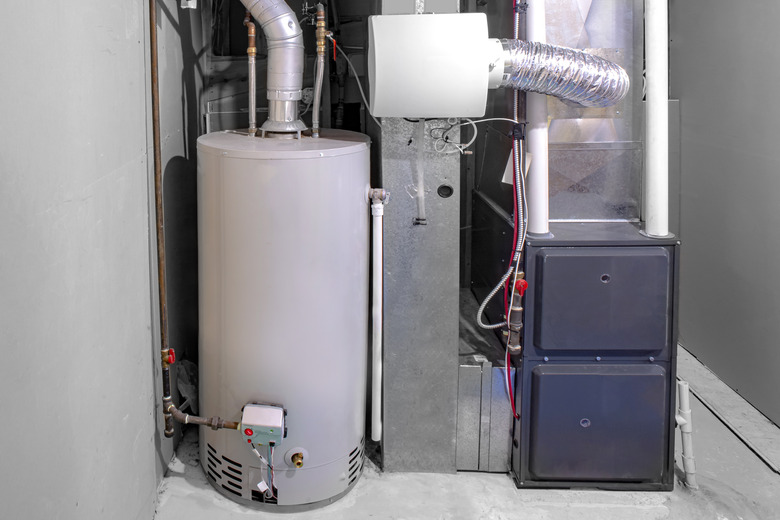Dangers Of Gas Water Heaters
Every so often, a story hits the local newspaper of a house fire caused by a gas water heater. Generally, the fire starts by flammable materials left lying to close to the tank. Some people get a little nervous just hearing the gurgling sound the water heater makes, thinking that it will explode at any moment. There are dangers involved with gas water heaters, but these can be avoided with regular water heater maintenance and extra caution on the homeowner's part.
Tip
Some possibilities of dangers from gas water heaters include carbon monoxide gas in your home, fire hazards and explosion. Being aware of these dangers and maintaining your water heater help prevent them.
Carbon Monoxide Poisoning
Carbon Monoxide Poisoning
Gas appliances in the home that are not properly vented can cause carbon monoxide poisoning in people and pets living in the home. Carbon monoxide is a colorless, odorless gas that can make you suddenly ill or even quickly cause death. Common symptoms of carbon monoxide poisoning include headache, weakness, nausea, dizziness, chest pain, vomiting and confusion.
Carbon monoxide is a silent killer because people who are sleeping can die from poisoning before symptoms are noticed. Have your water heater serviced regularly and install carbon monoxide detectors on every level of your home to protect your family. You can get a battery-powered carbon monoxide detector with no wiring required for easy installation.
Fire From Vapors
Fire From Vapors
Flammable vapor fires happen when vapors from that gas water heater collect around the appliance and ignite when the water heater kicks on. Combustible materials such as gasoline cans, cleaners and paints, as well as old papers and clothes can be ignited during a vapor fire and cause further damage. Keep the area around your water heater clear to eliminate that fuel for the fire.
Gas Water Heater Explosions
Gas Water Heater Explosions
Explosions of gas water heaters can happen for two reasons. In new gas water heaters, the bottom is sealed, so there is less chance of vapors getting to the flame. In older gas water heaters, there was no seal, and the bottom was virtually open, posing an explosion risk. Another reason for explosion of a gas water heater is a faulty pressure relief valve. If this is not working properly, pressure will build up on the inside of the tank until it can hold no more, resulting in explosion. Never, under any circumstances, cap a pressure relief valve.
Gas appliances, including gas water heaters, can also experience gas leaks over time. One little spark can cause an explosion in your home. If you smell gas, get out of the home and contact the gas company immediately. They can check for the presence of gas and determine if you need to make repairs.
Preventing Gas Water Heater Dangers
Preventing Gas Water Heater Dangers
To help prevent accidents related to gas water heaters, be sure that the water heater is properly vented. Put carbon monoxide detectors throughout your home to alert you if the levels should become dangerous. Keep the area around and near the gas water heater clean, using plain water, if possible. Chemicals found in cleaners may be a dangerous mix with gas fumes coming from the water heater. Also keep the area clear of combustible or flammable materials. Do not store or use any type of chemicals near the water heater.
Alternatives to Gas Water Heaters
Alternatives to Gas Water Heaters
If you would like to avoid the dangers of gas water heaters, there are alternatives. Electric water heaters use electricity to heat water, so there are no vapors to escape, and there is no risk of carbon monoxide poisoning. You may also want to check out solar water heaters, which are extremely safe and energy efficient. Installing a different type of water heater can be expensive since your contractor might need to run new power sources and change the configuration.
